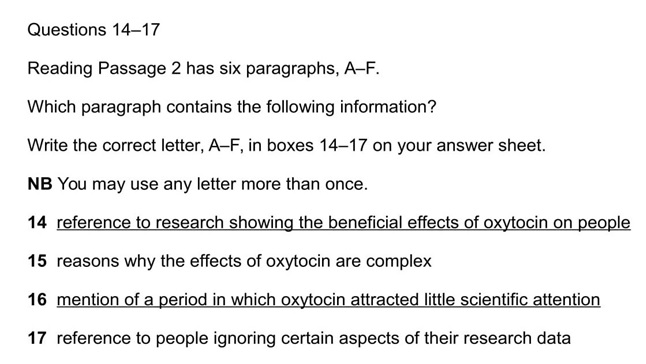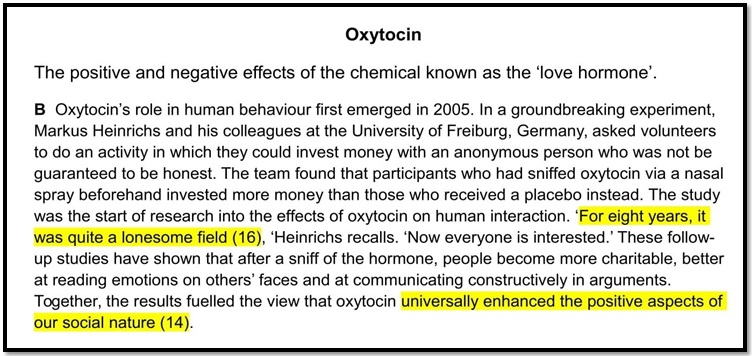
1) Read the instructions carefully
If you don’t follow the instructions exactly as they’re written, especially regarding how to write your answers, an answer may be marked wrong even if the information you have given is correct.
The easiest mistake to make is writing the wrong number of words. The instructions might tell you, for example, to answer in one of these ways:
• One word only
• No more than two words
• No more than three words and/or a number
If you answer with the incorrect number of words, you won’t get the mark.
They are very strict about this. So, if you’re asked, say, for a one word answer which is ‘volcano’ and you write ‘a volcano’, you’ll score nothing for it.
This may seem harsh but remember, you are being tested on your reading skills and understanding the instructions is a big part of this.
The instructions will differ from question to question so take extreme care. You’ll find help on how to answer each of the 12 different question types in the individual lessons on each one.
The 12 question types:
1) Matching Headings
2) Multiple Choices
3) Short Answer
4) Name Matching
5) True, False, Not Given
6) Yes, No, Not Given
7) Summary Completion
8) Matching Sentence Endings
9) Sentence Completion
10) Matching Paragraph Information
11) Table Completion
12) Diagram Labelling
2) Learn skimming and scanning skills
The second of our IELTS Reading tips identifies two key skills that you need to master for a high score. Together they will speed up your reading and help you to locate the answer quickly.
If you’re not sure what these terms mean, here are the definitions:
•
Skimming – to read a text quickly in order to understand the general meaning. You don’t read each word or study the text in detail as you’re only trying to get the gist of what it’s about.
•
Scanning – to read a text quickly in order to find specific information such a key words, names, numbers, dates or synonyms, that will help you locate where the answer is.
These are skills that you already use every day without even realising you’re doing so.
To understand more about them and learn how to apply them to the Reading test, read this page: IELTS Reading Skills.
3) Read the questions first
Always read the questions before reading the text. By doing this, you’ll notice specific words, names, numbers and dates included in them as you then read the text.
This will help you to locate the relevant information again when searching for the answers. It will also aid your understanding of the text as the questions contain clues as to what it’s about.
4) Focus on the topic sentences
The fourth of our IELTS reading tips will help you to quickly understand what the text is about. It’s part of the skimming technique but deserves a separate mention as it’s so important.
A ‘topic sentence’ is the first line of a paragraph and introduces the main idea of that paragraph. If you were to read just the topic sentences of a text, you’d have a fairly good idea of what the article was about.
This makes topic sentences powerful tools to help your general understanding of the whole text without reading it in detail.
5) Practice guessing meaning from context
You are not going to understand every word of the text so don’t panic when you come across one you don’t know. Getting stressed will only impair your ability to think. Accept that this is going to happen and practice making an educated guess at unfamiliar vocabulary during your test preparation.
Making an educated guess means looking at the text that comes immediately before and after the unknown word or phrase and using your understanding of this to work out what the new word might be.
Practice guessing meaning from context during your general reading practice. Instead of grabbing the dictionary to look up a new word, spend a little time trying to working out its meaning in the context of the sentence or paragraph.
6) Improve your vocabulary
In many ways, this is the most important of all the IELTS Reading tips I could give you. The reality is, the Reading test is essentially a vocabulary test. It’s your knowledge of vocabulary that will ultimately determine your score.
However, it’s not just a wide variety of words you need to know but also their synonyms, that is, words with the same or a very similar meaning.
Many of the questions will seem quite straight forward until you come to search for the answers and can’t find matching keywords and phrases in the text. This is because synonyms have been used or the question paraphrases the information in the text.
Let me demonstrate with an example from a past IELTS paper. Here are the instructions and questions:
7) Check your spelling and grammar
The final item in our list of IELTS reading tips is something so basic that it shouldn’t need mentioning, but it does.
Many of your answers will come directly from the text so there’s no excuse for spelling and grammar mistakes, yet many people make them.
If your answer is correct but you have spelt it wrong or your grammar is incorrect, it will be marked wrong. Check it.
Don’t give away marks because of carelessness.

There is no complex language here and at first sight you’d think it would be easy to locate this information. Well, you can be pretty sure that it won’t be and that both synonyms and paraphrasing will be used which is, in fact, the case.
We’re going to look at 14 and 16, both of which are in paragraph B. I’ve reproduced the paragraph below with the phases that contain the information highlighted and the matching phrase number in brackets.

Here are the matching phrases written together. As you can see, there’s quite a bit of interpretation needed.
14 reference to research showing the beneficial effects of oxytocins on people
Universally enhanced the positive aspects of our social nature
16 mention of a period in which oxytocin attracted little scientific attention
For eight years, it was quite a lonesome field
In another question on the same text, candidates have to identify which researcher discovered that ‘Oxytocin increases people’s feelings of jealousy’. Here is the section of text that contains the same information.
‘When volunteers played a competitive game, those who inhaled the hormone felt more... envy when others won.’
Can you spot the synonym that has been used?
• jealousy – envy
This is typical of how synonyms are used in the test.
My second IELTS Reading tip regarding vocabulary is to study the vocabulary section of my website. In it you’ll find out:
• What to learn
• How to record it
• How to learn it
I’ve also created many topic vocabulary pages that will help you improve your vocabulary for every part of the IELTS exam.
Visit these pages: